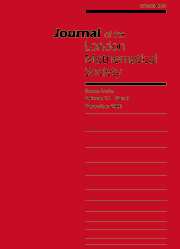Article contents
SCHEMES OF TORI AND THE STRUCTURE OF TAME RESTRICTED LIE ALGEBRAS
Published online by Cambridge University Press: 05 July 2001
Abstract
Much of the recent progress in the representation theory of infinitesimal group schemes rests on the application of algebro-geometric techniques related to the notion of cohomological support varieties (cf. [6, 8–10]). The noncohomological characterization of these varieties via the so-called rank varieties (see [21, 22]) involves schemes of additive subgroups that are the infinitesimal counterparts of the elementary abelian groups. In this note we introduce another geometric tool by considering schemes of tori of restricted Lie algebras. Our interest in these derives from the study of infinitesimal groups of tame representation type, whose determination [12] necessitates the results to be presented in §4 and §5 as well as techniques from abstract representation theory.
In contrast to the classical case of complex Lie algebras, the information on the structure of a restricted Lie algebra that can be extracted from its root systems is highly sensitive to the choice of the underlying maximal torus. Schemes of tori obviate this defect by allowing us to study algebraic families of root spaces. Accordingly, these schemes may also shed new light on various aspects of the structure theory of restricted Lie algebras. We intend to pursue these questions in a forthcoming paper [13], and focus here on first applications within representation theory.
Information
- Type
- Research Article
- Information
- Copyright
- The London Mathematical Society 2001
- 2
- Cited by

